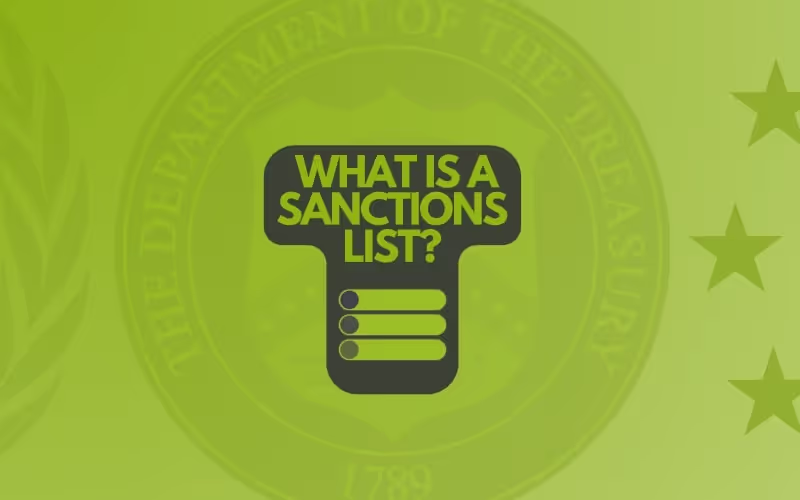
What Is a Sanctions List? Understand the Essentials
A sanctions list compiles individuals or entities targeted by a sanctions regime. And why are the listed parties in the crosshairs? Because many are involved in heinous crimes such as terrorism and human trafficking. National governments and intergovernmental organizations create sanctions lists. And crucially, failing to comply with them could spell severe trouble for businesses and organizations.
What Is a Sanctions List?
A sanctions list comprises individuals and entities specifically singled out by a sanctions regime. And what is a sanctions regime? All governments and intergovernmental organizations (IGOs) can issue sanctions and make a legally-binding list (depending on the jurisdiction).
The purpose of a sanction is to punish, influence, and even retaliate. Being on a sanctions list means consequences such as frozen assets, trade restrictions, and travel bans.
For businesses and organizations operating in the global economy, where access to currencies (e.g., dollars, euros, sterling) and the SWIFT cross-border payments system are essential, there are sanctions lists where failure to comply can create serious disruptions to operations and significant financial penalties.
In our ultimate guide to sanctions screening, you can find more in-depth information, but here are the most important ones:
- The OFAC Sanctions Lists (US)
- The UN Sanctions Lists (UN)
- The EU Consolidated List of Sanctions (EU)
- The HM Treasury Sanctions List (UK)

The total number of sanctions lists globally is difficult to estimate. But the number is substantial and is constantly changing. Countries such as Canada, Switzerland, Australia, and France (and many more) also have sanctions lists that many international companies and organizations must comply with.
A complicated issue for sanctions officers, who are employed to ensure the business or organization they represent is sanctions compliant, is this: How to decide which sanctions lists to comply with? And which ones not to? In the next section, we will look into this.
Why Some Sanctions Lists Are More Important Than Others
The reality is this: Some sanctions lists are much more important than others.
And let's make an example to illustrate this. Suppose the Office of Foreign Assets Control (OFAC), one of the most significant sanctions regimes globally, added a Member of Parliament (MP) from the United Kingdom (UK) on one of its sanctions lists. What do you think would happen? Devastation for the politician. And the individual likely did something illegal, such as corruption or money laundering.
Now imagine that the same politician is an upstanding MP and is not involved in any nefarious activity. Quite the opposite, the elected official is raising awareness about human rights abuses by a specific country. The country then places the politician on one of its sanctions lists - in retaliation.
Is the MP devasted in this situation? Probably not. It makes no difference. It's improbable that the politician holds any assets in the country, does business there, or plans a visit. In fact, the President of the United States, Joe Biden, is technically a sanctioned individual appearing on Russian sanctions lists (with little practical impact on him) in a tit-for-tat response to numerous US sanctions against Russia following the Russian invasion of Ukraine in 2022.
For businesses and organizations operating in the global economy, where access to dollars and other currencies used in international trade and cross-border transactions is essential, some sanctions regimes, like those mentioned earlier, are necessary to comply with - and others are not.
And the bottom line is this: In the dynamic international political environment, sanctions officers, or those with different job titles but have the responsibility, earn their salary by managing the complex risk that sanctions regimes and lists expose to their business or organization (depending on their unique circumstances).
Who Appears on Sanctions Lists?
We already know world leaders appear on sanctions lists, often in diplomatic and political contexts. But, of course, world leaders make up a tiny percentage of individuals and entities on sanctions lists. Here are the most common types:
- Terrorists
- Money Launderers
- Drug Lords
- Human Traffickers
- Arms Dealers
- Politicians (at all levels)
- Cyber Criminals
- Rogue States (with large numbers of individuals & entities)
It's also important to remember that complying with sanctions lists is far more than following laws and managing risk.
As the list above demonstrates, individuals and entities appearing on sanctions lists, such as those from OFAC, the UN, and the EU, are involved in criminal activity that poses a significant threat to global security, international stability, and the financial system's integrity.
Compliance with sanctions lists is also about being a business and organization that's a responsible and ethical global actor.
Why Sanctions Lists Are Crucial for Compliance & AML
We've discussed what sanctions lists are and why they exist. But they are also data assets designed to be accessed - for example, through APIs. And imagine if this wasn't the case. How would sanctions be enforced in practical terms on a wide scale? How would a sanction against an individual or entity have the intended effect?
As a data asset, sanctions lists enable businesses and organizations to do the following: Examine live data (the lists) in a sanction check as part of a sanctions screening process, and see if any customers, clients, suppliers, and other stakeholders appear on global sanction lists.
And you can even try it for yourself right now using sanctions.io's Free Sanctions Check (towards the bottom of the page). For example, if you type in 'Nicolas Maduro,' the sanctioned President of Venezuela appears on the US's Office of Foreign Assets Control (OFAC) Specially Designated Nationals (SDN) list.
Now if you imagine this process on a much larger scale, and even taking place within transactions through APIs (transaction screening), it becomes evident that sanctions lists play a vital role in minimizing risks of non-compliance and combating money laundering and countering the financing of terrorism (CFT).
How sanctions.io Helps With Sanctions Lists
The service offered by sanctions.io allows clients to access our sanctions database, which pools global sanctions lists together into one digital asset. For example, sanctions.io's developer-friendly database contains all the significant international sanctions lists, and also from countries such as Australia, Canada, Switzerland, France, the UAE, and many more. Additional lists are always available on demand.
We offer a free 7-day trial (no credit card is required).
You can get to know sanctions.io's service even with basic technology skills - for example, by simply uploading a .csv file with your client and business partner data. We would also be delighted to walk you through our service and answer all your queries regarding the sanctions.io API, integrations, and more. Book a free Discovery Call now.
sanctions.io is a highly reliable and cost-effective solution for sanction checking. AI-powered and with an enterprise-grade API with 99.99% uptime are reasons why customers globally trust us with their sanctions screening needs.



